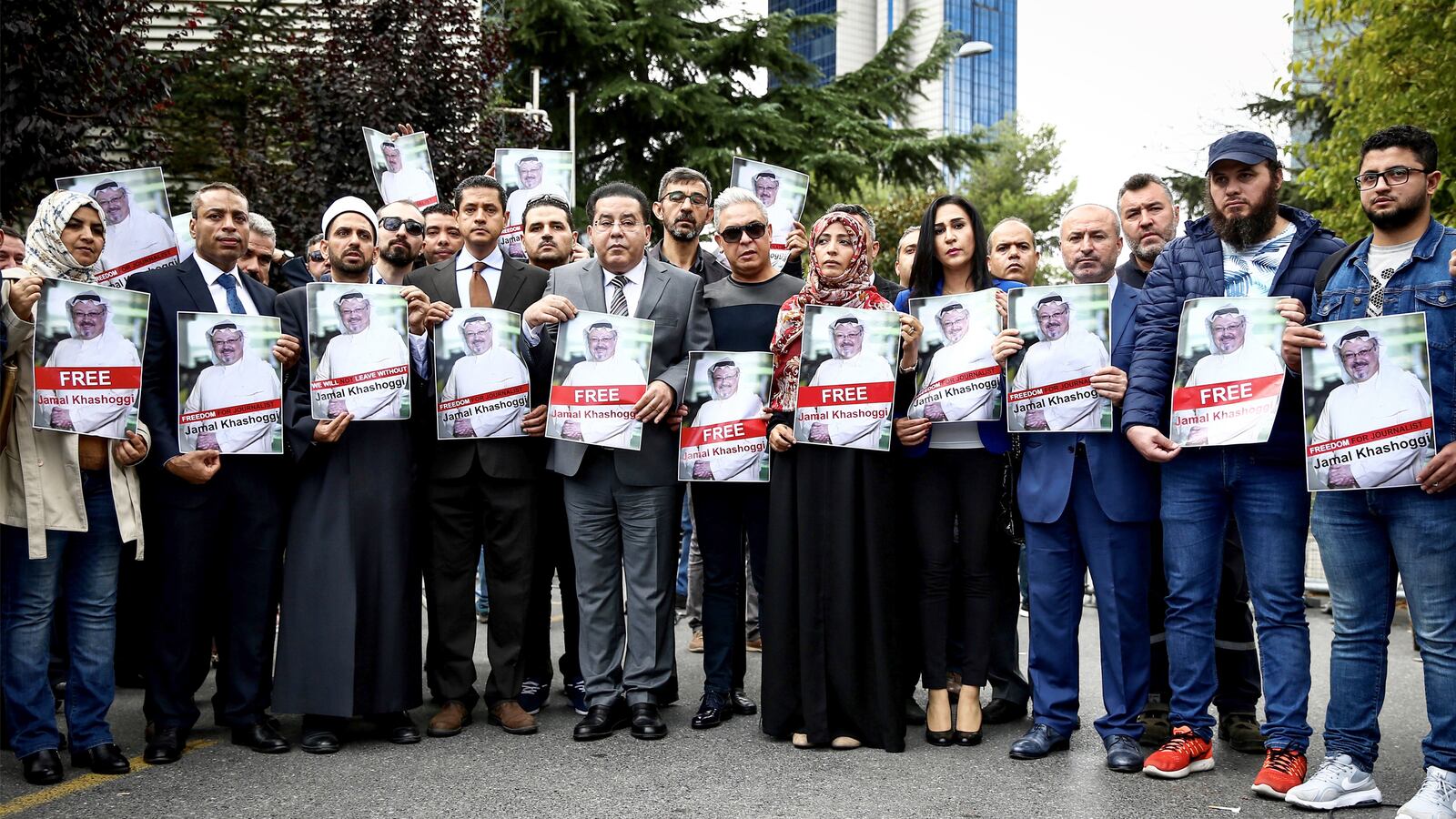As President Donald Trump reaffirmed his support for U.S. arms sales to Saudi Arabia Thursday, American lawmakers all but accused the Saudi government of having murdered Washington Post columnist Jamal Khashoggi and warned of significant punishments, including axing those weapons sales.
Trump indicated in a Fox News interview Wednesday night that he would be hesitant to cut off U.S. weapon sales to Saudi Arabia, calling it “a very tough pill to swallow for our country.” And on Thursday, he warned that cutting off military aid to Saudi Arabia would hurt American jobs.
“I would not be in favor of stopping a country from spending $110 billion—which is an all-time record—and letting Russia have that money and letting China have that money,” Trump said.
But senators warned of punitive action against the Saudi government if it can not deliver definitive proof that it was not involved in the disappearance of Khashoggi, a Saudi citizen who has been critical of Riyadh in his writing and has not been seen or heard from since entering the Saudi consulate in Istanbul last Tuesday.
“If we find that they murdered Khashoggi, there is no way we can do business as usual with the Saudi government. No way,” Sen. Jeff Flake (R-AZ), a member of the Senate Foreign Relations Committee, told The Daily Beast, pushing back on Trump’s comments.
“That would be a disaster,” added Sen. Tim Kaine (D-VA), also a member of the committee. “I don’t see how the United States can overlook a human-rights violation as gross as this.”
Lawmakers have started to push back legislatively. Sen. Rand Paul (R-KY), who has been critical of the U.S.’s support for the Saudi-led military campaign in Yemen, introduced a bill on Thursday that would cut off U.S. military aid to Saudi Arabia “until the secretary of state determines that Jamal Khashoggi is alive and free.”
And on Wednesday, the chairman and ranking member of the Senate Foreign Relations Committee, Sens. Bob Corker (R-TN) and Bob Menendez (D-NJ), took the dramatic step of triggering a Magnitsky Act investigation into Khashoggi’s disappearance, which would pave the way for human-rights sanctions against Saudi Arabia. By law, the Trump administration would then have 120 days to decide whether to impose those sanctions.
“We can’t let even an ally believe that they have carte blanche to do whatever they want,” said Menendez, who currently is exercising his procedural powers to block a proposed Saudi arms sale.
With the House on recess and the Senate skipping town Thursday until after the midterm elections, there is little that Congress could do while the Magnitsky probe is ongoing. But lawmakers insisted that if Trump proposes any new arms sale with Saudi Arabia, the Senate would exercise its power under law to nullify it. Corker implored Trump to not propose new arms sales to the Senate “because they will not pass, it will not happen.”
The Trump administration has considered its relationship with the Saudi government to be essential to its quest for Middle East peace, and Trump himself has spoken glowingly about Mohammed bin Salman, the Saudi crown prince. Moreover, the U.S. continues to support Saudi Arabia’s bombing campaign in Yemen, where it is propping up that government as it fights against Iran-backed Houthi rebels. But Congress has remained skeptical of that relationship, with top Republicans and Democrats positing that the U.S.-Saudi partnership has never been worse.
“We’re well aware that the administration has a huge investment in Saudi Arabia—not monetarily, but politically as it relates to the whole Middle East peace process,” Corker told The Daily Beast. “And we’re cognizant of that and support their efforts in that regard. But at the same time, you’ve got a young guy, who’s brilliant I might add, who’s probably going to be around for 40 or 50 years, and I’m sorry, he is ruthless… You’ve got to send a signal early on, if you’re going around killing journalists, I’m sorry, it’s totally inappropriate. And if he is involved, there’s got to be sanctions.”
Some senators warned that the Trump administration’s closeness with the Saudi government could make the president less likely to punish Riyadh over Khashoggi’s disappearance.
“I am very doubtful that the administration is going to use the Magnitsky Act to impose mandatory sanctions,” said Sen. Chris Murphy (D-CT), a member of the foreign relations committee.
“So I think it’s going to be left to Congress to make sure Saudi Arabia understands there are consequences.”







